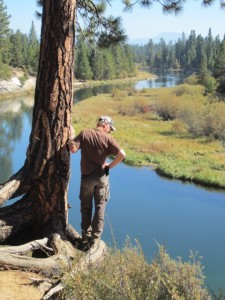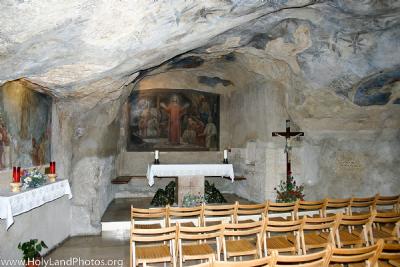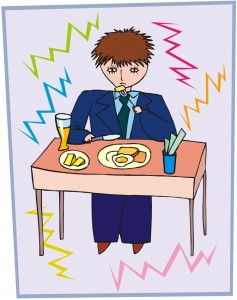Here is a list of scriptures that speak of “abiding” with or in YHVH in some way.
YHVH, who shall abide [Heb. goor meaning “to sojourn, dwell for a time, stay for a while, to assemble oneself with, to seek hospitality with”] in thy tabernacle? who shall dwell in thy holy hill? (Ps 15:1)
I will abide [Heb. goor] in thy tabernacle for ever: I will trust in the covert of thy wings. (Ps 61:4)
He shall abide [Heb. yashab meaing “to sit down, to set, to remain, to stay”] before Elohim for ever: O prepare mercy and truth, which may preserve him. (Ps 61:7)
He that dwelleth in the secret place of the most High shall abide [Heb. luwn meaning “to temporarily lodge, pass the night, stop over”] under the shadow of the Almighty. (Ps 91:1)
I am come a light into the world, that whosoever believeth on me should not abide [Gr. meno meaning “to remain, to sojourn, tarry, not to depart, to continue to be present, to be held, kept, continually] in darkness. (John 12:46)
And I will pray the Father, and he shall give you another Comforter, that he may abide [Gr. meno] with you for ever. (John 14:16)
Abide [Gr. meno] in me, and I in you. As the branch cannot bear fruit of itself, except it abide [Gr. meno] in the vine; no more can ye, except ye abide [Gr. meno] in me .… 6 If a man abide [Gr. meno] not in me, he is cast forth as a branch, and is withered; and men gather them, and cast them into the fire, and they are burned .… If ye abide [Gr. meno] in me, and my words abide [Gr. meno] in you, ye shall ask what ye will, and it shall be done unto you .… If ye keep my commandments, ye shall abide [Gr. meno] in my love; even as I have kept my Father’s commandments, and abide [Gr. meno] in his love. (John 15:4–10)
Let that therefore abide [Gr. meno] in you, which ye have heard from the beginning. If that which ye have heard from the beginning shall abide [Gr. meno] in you, ye also shall continue in the Son, and in the Father. … But the anointing which ye have received of him abide [Gr. meno] in you, and ye need not that any man teach you: but as the same anointing [chrisma, that which is smeared with oil] teacheth you of all things, and is truth, and is no lie, and even as it hath taught you, ye shall abide [Gr. meno] in him. 28 And now, little children, abide [Gr. meno] in him; that, when he shall appear, we may have confidence, and not be ashamed before him at his coming. (1 John 2:24, 27–28)
Humans Are Like Tree
In several places, the Bible poetically likens humans to trees.
But his delight is in the law of YHVH; and in his law doth he meditate day and night. 3 And he shall be like a tree planted by the rivers of water, that bringeth forth his fruit in his season; his leaf also shall not wither; and whatsoever he doeth shall prosper. 4 The ungodly are not so: but are like the chaff which the wind driveth away. (Ps 1:2)
For I will pour water upon him that is thirsty, and floods upon the dry ground: I will pour my spirit upon thy seed, and my blessing upon thine offspring: 4 And they shall spring up as among the grass, as willows by the water courses. (Isa 44:3)
Blessed is the man that trusteth in YHVH, and whose hope YHVH is. 8 For he shall be as a tree planted by the waters, and that spreadeth out her roots by the river, and shall not see when heat cometh, but her leaf shall be green; and shall not be careful in the year of drought, neither shall cease from yielding fruit. (Jer 17:7)
Abiding in Yeshua, the Tree of Life — A Study of John 15:1–10
Now let’s combine the concept of abiding, humans being like trees and Yeshua as it relates to his teaching about abiding in him. Here is what Yeshua says in John 15:1–10:
I am the true vine, and my Father is the husbandman. 2 Every branch in me that beareth not fruit he taketh away: and every branch that beareth fruit, he purgeth it, that it may bring forth more fruit. 3 Now ye are clean through the word which I have spoken unto you. 4 Abide1 in me, and I in you. As the branch cannot bear fruit of itself, except it abide2 in the vine; no more can ye, except ye abide3 in me. 5 I am the vine, ye are the branches: He that abideth4 in me, and I in him, the same bringeth forth much fruit: for without me ye can do nothing. 6 If a man abide not in me, he is cast forth as a branch, and is withered; and men gather them, and cast them into the fire, and they are burned. 7 If ye abide in me5, and my words abide in you, ye shall ask what ye will, and it shall be done unto you. 8 Herein is my Father glorified, that ye bear much fruit; so shall ye be my disciples. 9 As the Father hath loved me, so have I loved you: continue ye in my love. 10 If ye keep my commandments, ye shall abide6 in my love; even as I have kept my Father’s commandments, and abide7 in his love. (John 15:1–10; the superscripted numbers indicate the word abide occurs seven times in the passage as it relates to a righteous person abiding in Yeshua.)
Yeshua relates the concept of abiding in him to a plant or a tree with branches. What are the spiritual implications of abiding in Yeshua and do we abide in him?
The term abide is found nine times in this passage. Seven of the those nine times are in reference to abiding in Yeshua or his Father. Seven is the biblical number of completion or perfection. When we abide in Yeshua and his Father, then we’re made perfect or complete in all areas of our life: spiritually, physically, mentally and emotionally. The result is that we will bear much spiritual fruit for him; namely, we will produce the fruit of the Spirit in our lives (Gal 5:22–23).

Let’s explore the spiritual dynamics of abiding in Yeshua that enable us to be spiritually complete and to produce good fruit that will result in changing the world around us for the better, and keep us on the path of righteousness, which leads to eternal life as sons and daughters of Elohim in his heaven on earth kingdom.
Here is what we can learn from John 15:
- We are made clean (Gr. katharos meaning “to be made pure, blameless, innocent; free of corrupt desire, sin, guilt and from that which is false”) through the Word of Elohim (John 15:3, 7).
- We must continue or abide in the love of Yeshua by keeping his and the Father’s commandments (John 15:10).
- We must love one another (John 15:12–17). How do we do this?
- We must practice the key elements Yeshua taught in the Sermon on the Mount. This includes the following: Continue reading →






